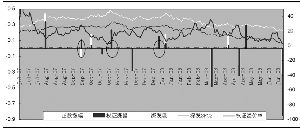The trend and stage performance of Shenzhen Stock Exchange SFC2 and regular shares
⊙ Qiu Xiaoping of Zhejiang Securities Research Institute
Leverage has always been one of the most attractive and significant advantages of warrants. If the implied volatility remains unchanged, due to the existence of leverage, the rise and fall of warrants will generally exceed the rise and fall of regular shares, and the higher the leverage, the greater the excess. However, due to such factors as the high valuation of Chinese warrants, the scarcity of warrant varieties and the lack of short selling mechanism, Chinese warrants show significantly different characteristics at each stage from listing to delisting, which we call "the life cycle of warrants" vividly.
From the historical trend of SFC2 and warrants that have expired before, we can conclude the general rule of warrant operation in China, that is, the "life cycle" of warrants can be roughly divided into the following four stages:
The first stage is the stage of overestimation. Due to the practice of "speculation" in China's securities market, warrants are generally overvalued at the beginning of listing. However, this stage generally does not last too long, especially when the circulation is large or the overall market is adjusted, the duration will be shorter.
The second stage is the value return stage. At this stage, the premium rate and implied volatility of warrants will approach the average level of warrants.
The third stage is to follow the steps. The trend of warrants will show certain "inertia" and "rigidity" at this time. The so-called "inertia" refers to the fact that the trend of warrants is almost the same as that of regular shares, which is difficult to reflect leverage. The so-called "rigidity" means that if the positive shares rise sharply, the price of warrants and the degree of both inside and outside the price will continue to increase, the premium rate will continue to decline, and some even have a large discount; On the contrary, if the positive shares fall sharply, the price of warrants and the degree of both inside and outside the price will continue to decline. When the price drops to a certain extent, it will refuse to continue to decline (significantly), and the premium rate of warrants will continue to rise.
The fourth stage is the return stage of internal value. At this stage, warrants will accelerate their return to the intrinsic value (out of price warrants will "return to zero"), and the price and premium rate of warrants will continue to decline, but the leverage will continue to increase. Due to high leverage, warrants are generally unwilling to return to "calm", and there will always be hot money speculation. Of course, if the warrants are still in the deep price when they expire, and the premium rate is near zero, their trend will be relatively stable, while the trend of discount warrants will be slightly stronger than that of regular shares.
In addition, through research, it is found that the price level, out of price and deep in price warrants also have similar "life cycle" characteristics. Therefore, a good grasp of the "life cycle" of warrants will have a certain guiding significance for investors to invest in warrants. Specifically, first of all, we should avoid buying warrants in the first, second and fourth stages of warrants. In the first two stages, the valuation of warrants is high, and buying warrants is better than buying stocks. In the fourth stage, low prices may bring opportunities, but the risks will be greater at this time. Secondly, in the third stage, when the warrants show rigidity (resistance) in the process of rising, investors should sell them appropriately. When the decline shows rigidity (support), investors can increase their warrants appropriately. Finally, investors should grasp the investment opportunities brought by event driven. After the substantial adjustment of warrants and regular shares, if favorable policies or events are introduced, the performance of warrants will be better than that of regular shares.

